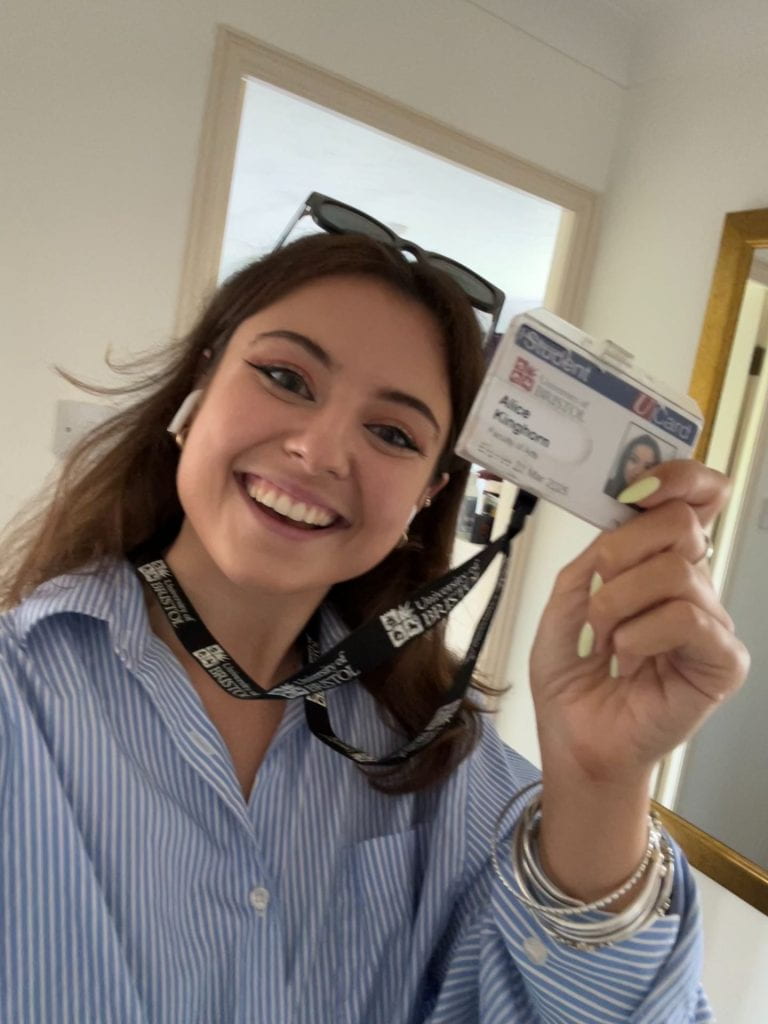Dr Alice Kinghorn completed their undergrad degree at the University of York, followed by an MA at the University of York, before joining Bristol for their PhD. Alice’s PhD examined Anglican missionary societies’ involvement in transatlantic slavery in the early nineteenth century, focusing specifically on Christian support networks behind these societies. Alice, who already has several articles published, successfully defended their PhD in December 2023. To keep up with their latest research, follow @KinghornAlice.
What was your doctoral research about?
My thesis examines the Church of England’s role in transatlantic slavery through the work of Anglican missionaries. I looked at two Anglican missionary societies: the Church Missionary Society (the CMS) and the Incorporated Society for the Conversion and Religious Instruction and Education of the Negro Slaves in the British West India Islands (The Conversion Society). Firstly, I looked at the financial support of both societies by cross-referencing donors and subscribers with UCL’s Legacies of British Slavery Database. This demonstrated the extent to which the West India Interest supported both societies. Secondly, I assessed how Anglican missionaries worked in the Caribbean, including schooling systems. The motivations of the missionary societies and their funders revealed important aspects of both the Church of England’s attitudes towards colonial slavery, determining that Anglican missionaries ultimately worked to delay emancipation. Additionally, I looked at interactions between missionaries and enslaved people which revealed new ideas about enslaved people’s religious experiences in the British Caribbean. I argued that while Anglican missionaries were integral to plans to delay emancipation, enslaved people’s decisions shaped the extent to which their objectives were achieved.
I started my PhD in September 2020, and so archive access was really difficult in my first year. The main archive for my research (Lambeth Palace Library) was closed until October 2021. However, this actually ended up shaping my research as I was limited to the sources I could find online. These were mostly annual reports for missionary societies, and so I developed the idea to research the societies’ financial support during this time. When the archives opened again, I was able to complete the qualitative research for my thesis (mostly through missionary correspondence).
The most exciting element of my research has been the travel opportunities during my time at Bristol. I undertook research at the Archives of Antigua and Barbuda, and presented at conferences in France and Chicago. Whilst I was unable to travel to archives at all in my first year, I certainly made up for it later on.
I was nervous for my viva – not because I didn’t think I knew my thesis, but because I didn’t really know what to expect. My supervisors were incredibly helpful by explaining what the format of the viva would look like, and by giving me some questions to think about beforehand. They also reiterated that the viva is an enjoyable experience as your examiners have taken the time to closely read and evaluate your work.
I would say think about why you undertook your research in the first place, its originality, its significance within your field more widely, and any future plans you have for publication/research. I also looked at scholarship that had been published since I submitted, and came prepared to discuss parts of my research that I might have done differently on reflection. I ended up really enjoying my viva!
I have a few projects lined up that continue research into the Church of England and transatlantic slavery, both in research and public engagement. I am hoping to turn my PhD into a monograph and to publish two more articles this year, with the view of applying for postdocs in the next academic year.
If you do decide to pursue a PhD, try to get as involved in as many research groups/research opportunities as you can (if you feel like you have the time/capacity). I built up support networks this way, both in terms of research and friendship, that were invaluable to my research experience. My research profile wasn’t confined to my thesis, and I gained experience in public engagement, publishing, and working with stakeholders.

